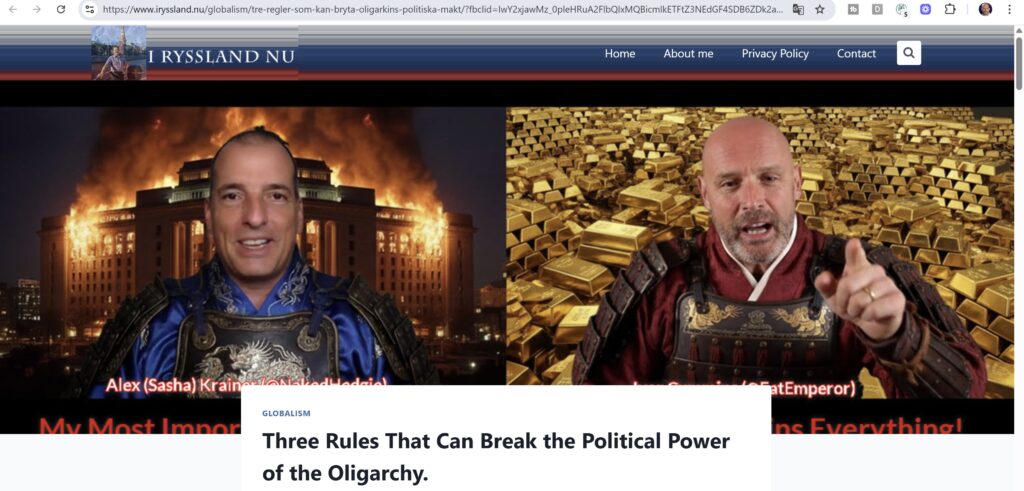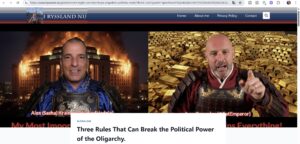Hey guys this is a fantastic summary (original post in Swedish: https://www.iryssland.nu/globalism/tre-regler-som-kan-bryta-oligarkins-politiska-makt/ )
Three Rules That Can Break the Political Power of the Oligarchy.
From Chaos to Order: Putin’s Russian Lesson for a West in the Grip of the Oligarchs
Imagine for a moment that the real power does not lie with the elected presidents or prime ministers. Imagine that the great historical events, the rise and fall of nations, are not a series of random events, but pieces in a global chess game played by a small, invisible elite. As early as the 1960s, historian Carroll Quigley formulated the goal of this elite in his book “Tragedy & Hope”:
“…the powers of financial capitalism had a far-reaching goal, nothing less than to create a world system of financial control in private hands, which could dominate the political system of every country and the economy of the world as a whole.”
This vision of a global, privately controlled world order is not a conspiracy theory from the dark corners of the internet; it is an explicit ambition of a historical power structure. And to understand how to resist it, we must turn our gaze to Russia and the dramatic turnaround it underwent from total decline to restored sovereignty.
This living history is captured in the conversation between Alex Krainer and Ivor Cummins. In the video ( https://www.youtube.com/watch?v=VwNNPNL-KKc ) they discuss these events with sharpness and depth, from the oligarchs’ takeover to Putin’s strategic moves. Krainer, with his background in finance and geopolitics, breaks down how “the whole country turned into a mess” under Yeltsin, and how Putin’s rules reversed the trend. Cummins, as host, asks the right questions that unlock the insights, and together they paint a picture of a world where the influence of the oligarchs is like an eternal wind blowing through time, but which can be tamed with courageous decisions.
History Repeats itself: The Lending Oligarchy
Throughout history, a “lending oligarchy” has acted as a driving force behind the rise and, inevitably, the fall of empires. This financial elite acts as a parasite: it attaches itself to a strong host empire, lending money, financing both sides of wars, and amassing enormous wealth and influence. When the host empire inevitably weakens through debt and internal conflict, the elite shifts its capital and loyalty to the next rising power.
After the US severed the dollar’s link to gold in the 1970s, this global oligarchy realized that the days of American hegemony were numbered. It began preparing the next host organism: China. By moving the industrial base of the West to China, the plan was to build up the country and then, when the time was right, take control of its assets through financial mechanisms – a large-scale plunder, just as has been done elsewhere.
But something didn’t go according to plan. Xi Jinping and the Chinese Communist Party turned out to be more cunning than expected. They welcomed the investment, the technology, and the jobs, but when it came down to it, they refused to hand over the keys to their own house. They outsmarted the global financial elite and secured China’s assets for China.
Russia on its Knees: The Darkness of the 90s
But before China showed its strength, there was another, more frightening example of what happens when oligarchs are given free rein: Russia in the 1990s. After the fall of the Soviet Union, the country was thrown into a chaotic neoliberal experiment. As Alex Krainer describes in his acclaimed conversation with Ivor Cummins, it was a period of total social and economic decay.
Under Boris Yeltsin, a president who was effectively ruled by a small clique, Russia experienced a disaster:
- GDP collapse: The country’s economy shrank by a shocking 50%.
- Mass poverty: Over 40% of the population lived below the poverty line, and one in four Russians lived in extreme poverty.
- Legal Collapse: Law and order broke down. Street fights between rival gangs became commonplace in Moscow and St. Petersburg. The military was in shambles.
The real power lay with a group that called itself “Sembankir” – seven bankers who had usurped the country’s wealth during the chaotic privatizations. They ruled Russia. They dictated policy. The country was effectively a “failed state”, plundered from within by its own interests and from without by global interests.
The Turnaround: Putin and the Three Rules
In 1999, an ailing Boris Yeltsin appoints a relatively unknown former KGB agent, Vladimir Putin, as prime minister. Shortly thereafter, Putin wins the presidential election, and that’s when the historic chess move is made.
In 2003, Putin summoned Russia’s fifteen most powerful oligarchs, including the seven bankers, to a meeting in the Kremlin. Around a large, round table, in a scene that could have been taken from a movie, he didn’t propose a negotiation—he laid out the new rules. As Krainer recounts it, the message was crystal clear, consisting of three simple but transformative points:
- “You keep what you stole.”Putin promised not to renationalize their property. A pragmatic concession to avoid a full-scale civil war with the country’s richest men.
- “No politics.”This was the most important rule of all. The oligarchs were forbidden from using their money and influence to direct the country’s politics, foreign policy, or social development. Their time as Russia’s de facto government was over.
- “Pay taxes and treat your employees well.”They had to act as responsible businessmen within the laws of the land, not as feudal lords.
This was nothing less than a declaration of national sovereignty. Putin drew a red line in the sand between the power of the state and the capital of the oligarchs.
Of course, the new order was tested. Mikhail Khodorkovsky, then Russia’s richest man and, as Krainer notes, “the steward of Jacob Rothschild’s interests in Russia,” openly challenged Putin. He believed himself to be more powerful. The response was swift and brutal: Khodorkovsky was arrested, charged with tax evasion, and sentenced to nine years in prison. The message to the rest of the oligarchs was unmistakable: “Don’t mess with it. I’ve set the rules. You have to follow them.”
And they followed them.
From that moment, when the oligarchs could no longer dictate the terms, Russia underwent what Krainer calls a “spectacular turnaround.” Chaos was replaced by order. Poverty was drastically reduced. State coffers were replenished. Russia once again began to act as a sovereign nation on the world stage. Although challenges remained, the downward spiral had been broken. Power had been returned from a small financial elite to the state.
A Model for the West?
Today, in the West, we see symptoms reminiscent of 1990s Russia: a growing gap between rich and poor, a sense that politicians are no longer in control, and that major decisions are being made in boardrooms and global forums far beyond democratic control. Carroll Quigley’s prophecy of a world system of private financial control feels more relevant than ever.
The Russian experience, with parallels to a similar development in China, is presented by Krainer, and offers a fascinating, if controversial, case study. It shows that it is possible for a strong national leader to confront oligarchic power and regain control. It required courage, a willingness to play hardball, and a clear vision of the nation’s interest over private financial interests.
The question we in the West must ask ourselves is an uncomfortable one: Are our leaders trapped in the same system that Yeltsin was? And if so, who has the courage to call their own round table meeting and declare that the game is up?
Watch the full conversation between Ivor Cummins and Alex Krainer in the video here: https://youtu.be/VwNNPNL-KKc
Alex and Ivor often refer to the book “Tragedy & Hope” by Carroll Quigley which contains a very comprehensive “biography” of the network of banking clans striving for global “full spectrum dominance”. Tragedy & Hope is no longer available in its original edition, but Joseph Plummer, who is also mentioned in the video, has compiled Quigley’s most essential theses in his book “Tragedy & Hope 101” which is freely available online. Download and read it below in a flip-book version with an even shorter summary of the main points as an introduction:
ORIGINAL POST IN SWEDISH: https://www.iryssland.nu/globalism/tre-regler-som-kan-bryta-oligarkins-politiska-makt/








